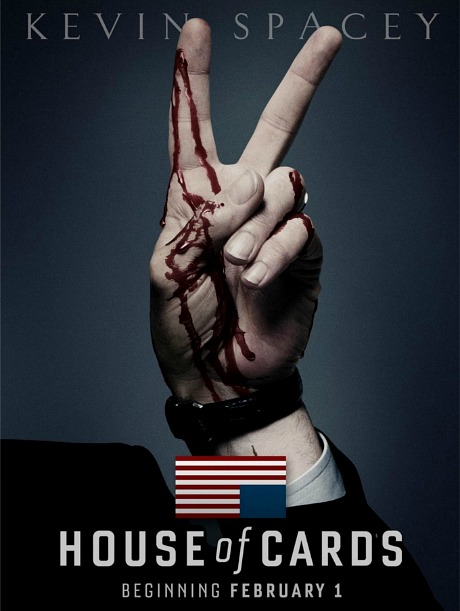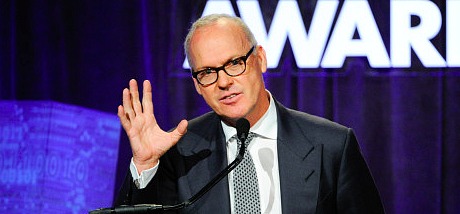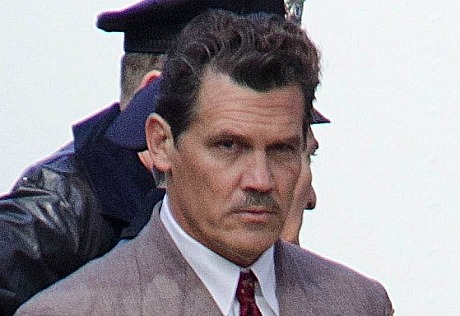With, as one of the big studio wheels in Sullivan’s Travels said, “A little sex in it.”
 Jeffrey Wells
Jeffrey Wells
Rabbit Ears
What’s the strategy behind House of Cards marketers looking to summon recollections of Richard Kelly‘s Donnie Darko (’01)? Is there any other way to read this?

Screener Gloat
We’re coming to the end of the Fed Ex and UPS freebie screeners. Nightcrawler is coming tomorrow, I’ve been told. Unbroken just arrived 15 minutes ago; the other two were delivered yesterday. The knife is big, long and sharp — a lethal weapon. It’s from the Chef guys at Open Road.

“I had gotten an impression from speaking with Indiewire‘s Eric Kohn that Chef is negligible fluff, but it’s too engaging to be dismissed as such. It’s basically a celebration-of-good-fortune movie…a celebration of perfect, scrumptious art-food (the cooking and serving shots are to-die-for), of clever guy humor and pothole-free narrative charm, of Favreau’s acting and writing skills (as well as John Leguizamo and Robert Downey, Jr.‘s)…okay, it’s fluff but it’s very tangy and alive and well-constructed fluff. It never once reached in and got me in that deep-down place, but I never felt the least bit irked or antagonistic toward it.
Nobody’s Business
Posting ill-gotten information about what this or that Sony employee earns is low and rude. I don’t want to know what Amy Pascal or Michael Barker or Michael Lynton earn. Or what Scott Feinberg or Tom O’Neil or Dave Karger earn for that matter. I don’t want to know about the annual wardrobe or travel budgets of the major Hollywood bloggers, or about their 401Ks or vacation homes in Maui, Montana, Belize or Switzerland, be they owned or time-shared, or their personal grooming expenses, not to mention assistant salaries and college tuition investments for their kids. This data (and I confess to having skimmed some of it) is private. I don’t want to know.
NBR Honors A Most Violent Year As 2014’s Best Film…Earthquake!
My mind is reeling, my emotions are caterwauling, and my balance is fairly unsteady. And somewhere up above Sidney Lumet is definitely smiling. For J.C. Chandor‘s A Most Violent Year, a movie I’ve been championing all along but which few others have really gotten behind in a super-passionate way, has been named 2014’s Best Film by the National Board of Review…eureka! The NBR has been regarded as an oddball group for so many years that that it’s not worth getting into it, but they’re at least regarded more favorably than the Golden Globes or the Hollywood Film Awards, or so I would argue, and you have to at least give them credit showing some real balls here. They went with their own heads and their own hearts, and they totally ignored the conventional Gold Derby/Gurus of Gold prediction template.
Don’t kid yourself — these bozos are looking to get as many stars to attend their awards ceremony as possible (hence Fury winning the best Ensemble Award, which means Brad and possibly Angie might show up) but this is the kind of winners roster I can really get behind of the most part. No lazy choices (they could have thrown a bone to Unbroken but for whatever reason but they abstained), no dutiful, knee-jerk Boyhood defaults (although Richard Linklater‘s film winning the top prize would have gotten no argument from me), no James Gray cabal to contend with, etc.
I only wish they hadn’t given American Sniper‘s Clint Eastwood their Best Director prize because no one (and I mean no one) believes that Sniper is the cat’s meow. A decent film but nothing to do cartwheels over. A very odd NBR call.
Red Army Fails To Make 2014 Feature Doc Short List
15 Feature-Length Documentaries were short-listed today. There are, in alphabetical order, Art and Craft, The Case against 8, Citizen Koch, Citizenfour, Finding Vivian Maier, The Internet’s Own Boy, Jodorowsky’s Dune, Keep On Keepin’ On, The Kill Team, Last Days in Vietnam, Life Itself, The Overnighters, The Salt of the Earth, Tales of the Grim Sleeper and Virunga.
The final five, I’m guessing, will be Citizenfour, Finding Vivian Maier, Life Itself, Last Days in Vietnam and The Salt of the Earth.
Significant blowoffs include Gabe Polsky‘s Red Army (a shocker), Chiemi Kurosawa‘s Elaine Stritch: Shoot Me, Claude Lanzmann‘s The Last of the Unjust, Iain Forsyth‘s 20,000 Days on Earth, Ryan McGarry‘s Code Black, Mark Levinson‘s Particle Fever, Joe Berlinger‘s Whitey: United States of America v. James J. Bulger, Alex Gibney‘s Finding Fela and Andrew Rossi‘s Ivory Tower.
2014 Is Just Weak Enough, Award-Mentality-Wise, To Allow For Boyhood Best Picture Win
2014 has not been a weak year in my personal book. Okay, maybe a little bit weaker compared to the recent past but you can’t be too lamenting about a lineup that includes Birdman, Citizenfour, The Babadook, Wild Tales, A Most Violent Year, Boyhood, Leviathan, Gone Girl, A Most Wanted Man, Nightcrawler, Locke, The Drop, The Grand Budapest Hotel, Edge of Tomorrow, Omar, etc. But in award-season terms it seems “weak” because the lazy Academy default crowd (the people who look to TheWrap‘s Steve Pond to interpret and explain and defend their aesthetic convictions to the outside world) feel that the 2014 season is lacking in Big Commanding Emotional Gushers, and so they’re kind of flailing around and going “yeah, sort of but not quite…I was hoping for more…where’s the Big Gorilla?…I kinda like that film but my friends don’t” and so on.
And so in this weak or somewhat pallid climate it’s entirely possible and perhaps even probable that a soft favorite like Boyhood could take the Best Picture Oscar at the end of the day. And that would be, in a certain sense, delightful. A little movie from IFC Films taking a bow in front of billions. A little Richard Linklater movie that’s not as good, really, as Before Midnight becoming “big” because of its family values essence and the stunt of shooting a kid’s life over a 12-year span, and despite the fact that it feels more like a series of short films than a truly fluid and unified whole, even though it’s obviously unified and flowing in so many impossible-to-ignore-or-deny ways. So it really could be Boyhood, especially given that my personal favorite, Birdman, has been meeting with resistance from women all along the trail. It’s clearly the only breathtaking film in Best Picture contention, but when people decide they’re going to be mule-stubborn about something there’s no stopping them.
Gotham Awards Comfort From A Booth at Genghis Cohen
I would have liked to attend last night’s Gotham Awards as this would have put a little fire in the stove as far as reporting about it. I watched a video stream on my Macbook Air from a booth at Genghis Cohen, but when I got home I couldn’t write it up. You can’t force these things. And then for some perverse, self-negating reason I popped in a screener of Jonathan Glazer‘s Under The Skin and quickly renewed my feelings of acute boredom and dislike for it. Yeah, it’s “brilliant”…sure thing, later. The guy who directed Sexy Beast died a long time ago.

Birdman‘s Michael Keaton during his acceptance speech at last night’s Gotham Awards.
I cheered the triumphs of Alejandro G. Inarritu‘s Birdman and star Michael Keaton when they won Best Feature and Best Actor. And like everyone else I felt assured by the first official, organizational declaration that “overdue” and sure-to-be-consecrated Julianne Moore is the right Best Actress contender at the right moment, and that the Bataan death march experience of Still Alice is not enough to interfere with this fait accompli.
I was especially heartened by Laura Poitras‘s Citizenfour winning Best Documentary only a few hours after this same honor was announced by the New York Film Critics Circle. The Academy’s dodo bird contingent now understands that blowing off Citizenfour as a Best Documentary Feature nominee will be regarded by the world community as nothing short of pathetic. Variety‘s Tim Gray and others have hinted that there may be a resistance to Citizenfour out here. Go for it, guys. As Christopher Plummer‘s Mike Wallace character says in The Insider, “Fame has a fifteen minute half-life…infamy lasts a little longer.”
Real John DuPont
I have to say that Steve Carell did a good job of capturing the Real McCoy. You can smell the creepiness, the malignancy. Are DuPont’s extended video riffs (minus a questioner or any give-and-take conversational vibe) bizarre or what? Did he rehearse or is he reading off cue cards? Foxcatcher director Bennett Miller decided against showing us the cows and the fishing hole.
Imagine This Series Being Pitched In The ’80s
Upon moving in with his married best friend Steve (Mark Duplass), Alex (Steve Zissis) says he can’t take “any beautiful L.A. people lookin’ at me like I’m a whale…they wanna fucking harpoon me.” That’s me — I’m one of those people. Actually not. When I see guys like Zissis I make a point of ignoring their whale-ness and concentrating on their minds and their souls, and that’s where it stays. But there’s no way I would fuck Zissis if I was Amanda Peet, who was double class-A material when younger and who still looks pretty hot, and yet her character in HBO’s Togetherness (debuting on 1.11.15) is so lonely and uncertain that she decides Zissis isn’t such a bad option and becomes his girlfriend. No way. A woman like Peet (I’ve known several like her) would never settle for a lardo with a loser profile (i.e., a guy who has had to move in with friends because he can’t pay his rent). But it happens in Togetherness because the politically correct view is that beefalo bods are just a trait and that some women are down with heavy guys and everybody goes through economic downswings, etc.
Numbskull Quartet
Over the last three months I somehow got turned around on Josh Brolin and George Clooney‘s roles in the currently-shooting Coen Bros. film Hail Caesar!, which is basically the fourth movie in their Numbskull Quartet with Clooney, following O Brother Where Art Thou?, Intolerable Cruelty and Burn After Reading. Last June I said I didn’t know who was playing who but more recently a vision of Clooney playing a big-studio manager-fixer named Eddie Mannix took hold along with Brolin as a none-too-bright movie star named Baird Whitlock. Wrong. Brolin has the Mannix role, which is the lead, and Clooney is Whitlock, a supporting part amidst a family large ensemble.

Brolin as Eddie Mannix, based on the real-life MGM vp who oversaw the day-to-day and put out fires. Brolin’s Mannix performs the same function for the fictitious Capitol Pictures.
Cotillard Lowdown, Weinstein Co. Indifference, James Gray “Cabal”, etc.
In my recently-posted piece about the 2014 New York Film Critics Circle winners, I expressed profound puzzlement about Marion Cotillard winning the Best Actress prize for her performances in Jean-Pierre and Luc Dardennes‘ Two Days, One Night as well as James Gray‘s The Immigrant. “Where did this Immigrant love come from?,” I asked. “What cabal of James Gray loyalists got together and rammed this through?”
A few minutes ago a friend explained that nobody has been talking about Cotillard as a Best Actress candidate at least partly because of the lackluster backing of the Weinstein Company.
“Even after The Immigrant trounced all other Weinstein titles (most notably, The Imitation Game) with both the Spirit Award nominating committee and now the NYFCC, the Weinstein Co. does not even list The immigrant on its ‘awards season’ screening RSVP website or its guild-friendly site, and until sending out an online screener to members of NYFCC in the middle of Thanksgiving weekend, had made no visible efforts to promote the film whatsoever.
“This in spite of the fact that The Immigrant had rave reviews pretty across the board when it opened last spring (76 on Metacritic to Imitation Game‘s 71 and Theory of Everything‘s 72). But I know, I know…it’s so much more interesting to theorize a burgeoning James Gray loyalist cabal in the NYFCC than going off the empirical evidence!”

